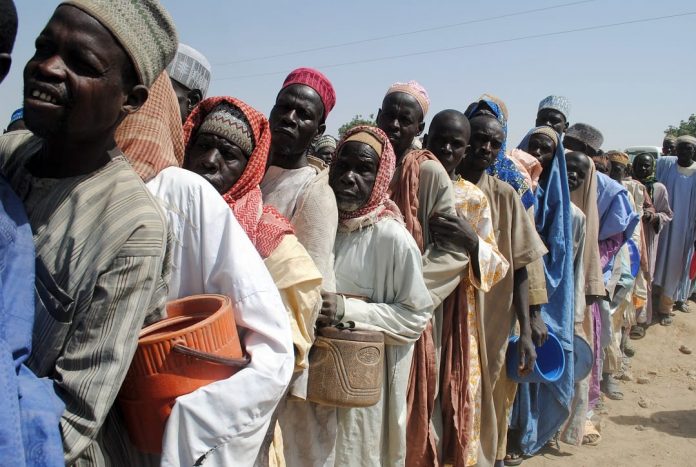
Nigeria is one of the countries that are most at risk of sliding further into hunger crisis this year without a rapid response and greater investment, according to a news report by the United Nations World Food Programme.
Others are Zimbabwe, South Sudan, Haiti, Central Sahel (Mali, Burkina and Western Niger), Democratic Republic of Congo, Afghanistan, Lebanon, Iraq, Southern Africa, Central African Republic, Cameroon, Libya, Bolivia and Ethiopia.
“A new decade may have dawned but there is little cause for fresh optimism in countries and regions where conflict, political instability and climate disasters are threatening the food security of millions of people,” the UN agency said in the report, titled ‘WFP Global Hotspots 2020: Potential flashpoints to look at for in New Year’.
WFP said an upsurge in violence in the North-East of Nigeria had resulted in a fresh wave of displacement, cutting off access to farming lands.
It said, “Nearly three million people are struggling to meet their food needs in Borno, Adamawa and Yobe states. That could rise to more than 3.8 million people in the June-August lean season. Close to 2.1 million people have been forced to leave their homes.”
According to the report, the WFP provides life-saving food and nutrition products to internally displaced people, returnees, young children and pregnant or breastfeeding women.
“WFP has conducted rapid assessments of the current situation, to inform its ongoing response,” it added.
WFP is the food-assistance branch of the UN and the world’s largest humanitarian organisation addressing and promoting food security.
The report said, “While WFP continues to provide extensive assistance to high-profile emergencies such as Yemen and Syria, Global Hotspots 2020 highlights the fastest-deteriorating emergencies requiring the world’s urgent attention.
“Sub-Saharan Africa dominates WFP’s analysis, with Zimbabwe, South Sudan, the Democratic Republic of the Congo and the Central Sahel region all needing immediate attention, given the urgent needs of children, women and men. Elsewhere,
Global Hotspots 2020 reports how a rapidly evolving political and social crisis in Haiti is raising alarm, while Afghanistan continues to face insecurity combined with drought, leaving millions of people uncertain of where their next meal will come from.”
Meanwhile the Buhari Media Organisation (BMO) has faulted the claims by the World Food Programme (WFP) that Nigeria risks sliding into a hunger crisis, insisting that the claim of the UN agency was presumptuous.
A statement signed by the Chairman and Secretary of the group, Niyi Akinsiju and Cassidy Madueke acknowledge the WFP’s humanitarian assistance in part of North-East Nigeria, but expressed shocked that it could list the country among ‘potential flashpoints to look out for in the New Year’.
The BMO said “There is no doubt that the UN agency and its partners require greater investment in view of the scope of work they need to handle across the world in 2020, but we won’t accept a situation where Nigeria is painted in a bad light.
“Yes, there is a crisis in a part of the North East which was referenced in the report titled ‘WFP Global Hotspots 2020: Potential flashpoints to look out for in New Year’, but there has not been a recent upsurge in violence in the region of the magnitude reflected in the report.
“Besides, the crisis has been largely restricted to a part of Borno, which is just one out of 36 states making up the country and we do not see how that could be interpreted to mean that Nigeria may face a hunger crisis with the type of bumper harvests it has recorded in recent years.
“We also wonder how WFP managed to restrict its conclusion on Niger to a part of that country (Western Niger) in the report but sees a far bigger country with more arable land as a potential flashpoint.”
The group stressed that BMO noted that the claim of a potential food crisis is coming at a time Nigeria was confirmed as the largest producer of rice in Africa, saying “the same country that WFP says is at risk of a hunger crisis has in the last three years witnessed a rice revolution to the extent that it was competing with Egypt.
“And now it has overtaken the North African country as the continent’s largest producer of rice with an average annual production of 4 million tonnes, according to the Africa Rice Center in Benin Republic.
“So as at the time those commissioned to do the WFP report were placing Nigeria among countries likely to face a food crisis, the country was steadily climbing up on the list of Africa’s top rice producers in only four years of President Muhammadu Buhari’s rice revolution.
“It is also on record that the World Food Programme has been buying grains from Nigeria and delivering it to other countries in the sub-region, so where did the authors of the report get the data for their doomsday report from”.
BMO asked the UN agency to take a second look at the report on the ground that it does not capture the real situation in the country and assured Nigerians that the Buhari administration is taking necessary steps to ensure food security not only in Borno state and its environs but also across the country.

